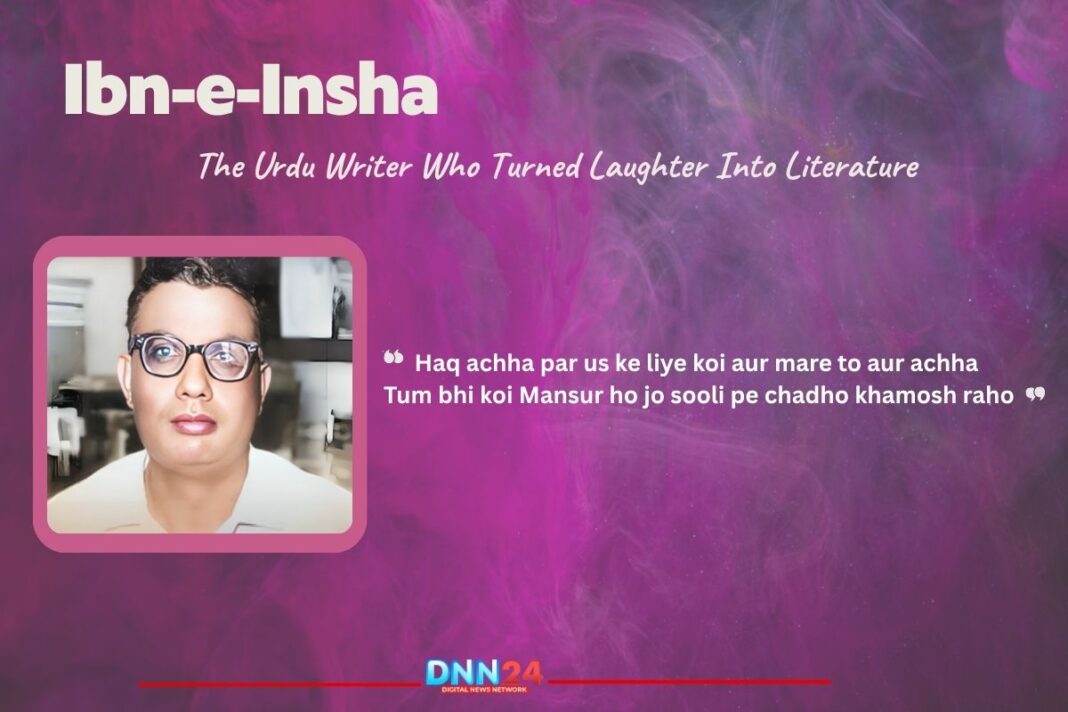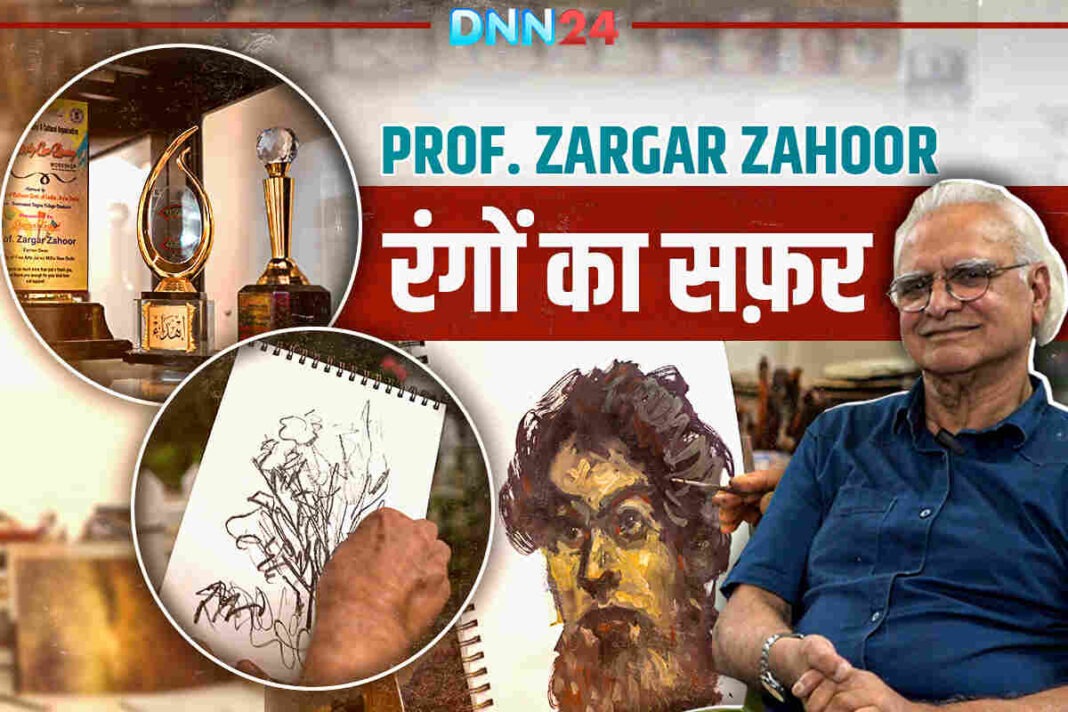A poet who made you smile before making you think, a satirist who never wounded, Ibn-e-Insha was the writer who proved that Urdu literature could laugh without losing its soul. While others composed tear-soaked ghazals, Ibn-e-Insha walked in with a notebook full of observations that hit harder than any tragedy. His pen was sharp, his heart softer than silk. He turned everyday absurdities into art and showed that heavy truths need not come wrapped in heavy words.
Kal chaudhvin ki raat thi shab bhar raha charcha tera
Kuchh ne kaha ye chaand hai kuchh ne kaha chehra tera
From Phillaur to the Literary World
Born as Sher Muhammad Khan on June 15, 1927, in Phillaur, a small town in Jalandhar district of Punjab, Ibn-e-Insha grew up in ordinary surroundings with an extraordinary mind. Nobody in that quiet place imagined this child would become one of Urdu literature’s most beloved voices. From early childhood, Ibn-e-Insha demonstrated a natural affinity for books and learning. He questioned everything, absorbed knowledge, and developed a distinctive worldview.
Ik saal gaya ik saal naya hai aane ko
Par waqt ka ab bhi hosh nahin deewane ko
His early pieces caught attention because they sounded different from everything else being published. When India was partitioned in 1947, Ibn-e-Insha’s family moved to Pakistan like millions of others. That painful journey of displacement and new beginnings changed him forever. The experience of partition, the confusion of new borders, and the strangeness of starting over all seeped into his writing. It made it richer, more human, and more understanding of life’s complexities and contradictions.
The Government Worker Who Became a Literary Legend
Ibn-e-Insha was not a starving artist living for his craft alone. He maintained a respectable government job and later worked with the United Nations, travelling extensively around the world. These travels became invaluable material for his writing. Ibn-e-Insha visited countries most Pakistanis had never heard of, met people from completely different cultures, and saw how human beings lived across the planet.
Kab lauta hai bahta paani bichhda sajan rootha dost
Hum ne usko apna jaana jab tak haath mein daaman tha
All these experiences greatly fed his imagination and broadened his perspective. The greatest quality of Ibn-e-Insha’s writing was his ability to wrap bitter truths in gentle humour. He never attacked directly, never used his pen as a weapon to wound. Instead, Ibn-e-Insha held up a mirror to society, making people laugh at their own reflections.
Vo raatein chaand ke saath gayin vo baatein chaand ke saath gayin
Ab sukh ke sapne kya dekhein jab dukh ka sooraj sar par ho
His essays felt like conversations with a wise friend who knows how to deliver uncomfortable truths without creating defensiveness. Every sentence Ibn-e-Insha wrote carried weight but felt light. Every observation stung slightly but never wounded deeply. He mastered the impossible art of being critical and loving simultaneously, of pointing out foolishness while maintaining deep affection for humanity.
Satire as an Act of Compassion
Most satirists write from a place of anger, using humour to disguise their rage. Ibn-e-Insha was fundamentally different. His satire emerged from deep affection for humanity and frustration with how foolishly people behaved. Ibn-e-Insha did not hate the world; he loved it too much to let it remain foolish. His writing poked fun at everything from government officials to ordinary citizens, from grand political theories to small daily habits.
Is shahr mein kis se milen hum se to chhuti mehfilein
Har shakhs tera naam le har shakhs deewana tera
But nobody felt insulted because underneath the jokes lay genuine care. Ibn-e-Insha often said that laughter is the best teacher because people drop their defences when they smile. A serious lecture makes people build walls, but a funny story opens doors. Where others wrote angry editorials that people forgot immediately, Ibn-e-Insha wrote humorous pieces that people remembered for decades.
Apni zabaan se kuchh na kahenge chup hi rahenge aashiq log
Tum se to itna ho sakta hai poochho haal becharon ka
His satire was never cheap or cruel. It required intelligence to understand and appreciate. Ibn-e-Insha expected his readers to think, to connect dots themselves, to realise the deeper point hiding behind the surface joke. This respect for his audience earned him their complete respect and trust in his observations.
Travel Writing That Becomes Philosophy
Ibn-e-Insha revolutionised travel writing in Urdu literature. Before him, travelogues were either dry factual accounts or overly poetic descriptions. Ibn-e-Insha created something entirely new, books that read like intimate diaries where every observation turned into a small life lesson. His most famous works include “Awara Gard Ki Diary” (Diary of a Wanderer) and “Duniya Gol Hai” (The World is Round).
Kooche ko tere chhod kar jogi hi ban jaayein magar
Ibn-e-Insha
Jangal tera parbat tera basti teri sehra tera
These books took readers on journeys not just across geography but across cultures and human nature. When Ibn-e-Insha described a foreign marketplace, he did not just tell you what was being sold; he also described the atmosphere and the people who were present. He told you what those goods revealed about people, what shopping habits said about values, and how bargaining styles reflected temperament. Ibn-e-Insha found universal human traits in the most specific local customs.
The Poet Behind the Humorist
People knew Ibn-e-Insha mostly as a humorist, but he was also a genuinely gifted poet. His poetry carried a different flavour from his prose, more romantic, more melancholic, yet fresh in expression. His most famous couplet remains widely quoted: “Kal chaudahvin ki raat thi shab bhar raha charcha tera / Kuchh ne kaha ye chand hai kuchh ne kaha chehra tera” (Last night was the fourteenth, all night they discussed you / Some called it the moon, others called it your face).
Insha ji uthho ab kuchh karo is shahr mein jee ko lagana kya
Ibn-e-Insha
Vahshi ko sukoon se kya matlab jogi ka nagar mein thikana kya
Ibn-e-Insha’s poetry spoke about love, longing, separation, and hope in a language that ordinary people could understand and feel. He avoided complicated Persian and Arabic words, believing poetry should touch hearts rather than impress scholars. Many poems by Ibn-e-Insha became popular ghazals that singers performed widely. His verses felt less like something created and more like something discovered, as if those words were always waiting to be arranged in exactly that order.
Books That Became Lifelong Companions
Ibn-e-Insha wrote several books that achieved something rare, they became companions people returned to throughout their lives. “Urdu Ki Aakhri Kitab” (The Last Book of Urdu) is perhaps his most celebrated work, a brilliant satire on education systems, social pretensions and political absurdities. The title itself is layered with meaning, implying this is the last book you will ever need, or predicting Urdu’s decline, or suggesting the language has reached its final form.
Dil hijr ke dard se bojhal hai ab aan milo to behtar ho
Ibn-e-Insha
Is baat se hum ko kya matlab ye kaise ho ye kyun kar ho
“Khumar-e-Ghalib” shows Ibn-e-Insha’s deep appreciation for the legendary poet Ghalib, analysing his work with scholarly depth and playful irreverence. “Dil-e-Wahshi” (The Wild Heart) collected his essays on various topics, each one a small masterpiece of observation. What made Ibn-e-Insha’s books special was how they aged. Most contemporary writing feels dated quickly, but Ibn-e-Insha’s work remains fresh because he wrote about permanent human nature rather than temporary events. Young people today can read his decades-old essays and think he is describing their world.
A Philosophy of Humanism and Joy
Ibn-e-Insha’s philosophy was simple but radical. He put human beings at the centre of everything and refused to let religion, nationality or ideology become more important than individual people. Ibn-e-Insha’s writing never directly preached this philosophy, he demonstrated it through his approach to every topic. When writing about different cultures, Ibn-e-Insha never positioned himself as superior. He was genuinely interested in how others lived, genuinely willing to learn from them, genuinely able to laugh at his own prejudices.
Hum kisi dar pe na thitke na kahin dastak di
Ibn-e-Insha
Saikdon dar the meri jaan tere dar se pehle
Ibn-e-Insha believed life should be lived with intelligence and humour rather than grim seriousness. He felt that too many people approached existence as a punishment to endure rather than a mystery to enjoy. His essays suggested that the ability to laugh, especially at yourself, was a form of wisdom. This did not mean avoiding serious subjects, but rather maintaining perspective, remembering that human foolishness is universal and enduring.
The Voice That Reached Millions
Beyond books, Ibn-e-Insha reached millions through journalism and radio. He worked at Radio Pakistan, where his voice became familiar in households nationwide. His radio talks were eagerly awaited because Ibn-e-Insha brought the same wit and wisdom to the spoken word that he brought to written text. He also wrote newspaper columns that readers would seek out first before reading anything else.
Garm aansu aur thandi aahein man mein kya kya mausam hain
Ibn-e-Insha
Is baghiya ke bhed na kholo sair karo khamosh raho
His journalism proved that commentary could be both informative and entertaining. Ibn-e-Insha never talked down to his audience, never assumed they were too simple to grasp complex ideas. At the same time, he never used unnecessary jargon. His conversational style made him beloved across all classes and education levels. Educated intellectuals admired his depth while ordinary readers enjoyed his clarity.
Ahl-e-wafa se tark-e-taalluq kar lo par ik baat kahen
Ibn-e-Insha
Kal tum inko yaad karoge kal tum inhein pukaroge
A Legacy That Lives Forever
On January 11, 1978, Ibn-e-Insha passed away at the age of fifty. It was far too early, far too sudden. But what Ibn-e-Insha left behind ensures his immortality. His books continue to be read, his poems continue to be recited, and his philosophy continues to influence new generations. The greatest tribute to any writer is when their work outlives them, when new people discover them decades later and wonder why nobody mentioned this brilliant mind earlier. Ibn-e-Insha achieved that rare status. People born after his death now consider him among their favourite writers.
Also Read: Saghar Siddiqui: Footpath Emperor Whose Poetry Echoed Pain and Love
You can connect with DNN24 on Facebook, Twitter, and Instagram and subscribe to our YouTube channel.



